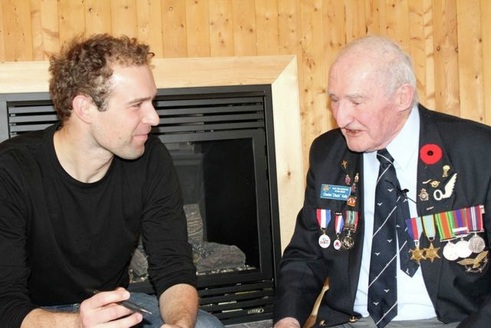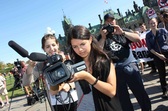This Remembrance Day I visited the Strathcona Legion in Ottawa East and interviewed some vets as part of a short video I'm working on for The Mainstreeter newspaper's website. On November 7th the Legion held a small ceremony at the Beckwith & Main cenotaph, which I attended and filmed with the help of Graham, Iffy, and Marta. I'm in the process of mixing this footage with interviews and "actuality" from the Legion gathering on Remembrance Day.
Anyways, I just finished transcribing my interviews and the vets had some terrific stories for me. One vet in particular, Charles Kelly, was a P.O.W. for three and a half years of the Second World War.
Listen. This is what he said:
Interview - Charles Kelly
Take 1
Introduction
00:00:34 – My name is Charles Kelly. K-E-L-L-Y. I was in the Air Force Bomber Command. I was the rank of flying officer. I operated with the RAF, although I was RCAF, I was attached to the RAF to get in bomber command.
00:01:25 – <inaudible due to the playing of bagpipes – C.P.>
00:01:49 – I went into the Air Force from artillery. And I went in August of 1940.
00:01:58 – <again with the bagpipes, what gives? C.P.>
Take 2
Introduction
00:00:00 – My name is Charles Kelly. K-E-L-L-Y. I was in the Air Force. I went into the Air Force in 1940. I trained as an observer. Observer in those days didn’t last too long. We did navigation, bombing, photography, engineering, and gunnery, as well. So that was split up into different jobs. They had a navigator, and then they had a photographer, and they had a gunner, so the jobs were broken down.
Life During Wartime
00:00:51 – So, when I got to England I got into bomber command. I was operating in Yorkshire in England, bomber flights over Europe. The two longest of the ones I was on – I went to Nuremburg, and I went to Berlin, with a lot of in betweens (laughs).
00:01:35 – I was in artillery, around 1938 forward. And then in 1940 I got in the Air Force and then I did my training, and then I went overseas. I had an interesting trip going overseas because the Bismarck, the big German battleship, was at loose in the Atlantic, and we were in a converted passenger liner as the convoy escort. One shot from the Bismarck and we wouldn’t have been around.
00:02:19 – <you can’t seriously still be playing those bagpipes. I’m trying to interview a war hero here. C.P.>
00:02: 24 – I got over, and I met with the King and Queen. They took us from where we landed to meet them. And the present Queen and her sister were in the room when I was there.
Life in Captivity
00:02:43 – I was flying in bomber command, and this was on the Berlin raid, and they had a bad night forecast, they said the wind would swing around and be the tail wind on the way home. Instead we had an increase in the wind against us. When we were north of Berlin, coming out, we had an engine short out… flying against the wind directly… we got back as far as Holland and the aircraft gave out. I parachuted in the dark, so you didn’t know where you were going. But we landed anyway, and we landed in a field instead of on a steeple or something (laughs).
00:04:00 – And then I did my knees in, so I couldn’t move very far, so the Germans got a hold of me and they made me a prisoner of war. And for three and a half years I was a prisoner of war. And an interesting thing was I was Air Force, they didn’t seem to realize it, they put me in with the army. Because of the Dieppe raid they found some German soldiers bodies in the water with their hands tied. And so, they wanted to take it out on us. If I’d been in an Air Force camp they wouldn’t have bothered, but they went after an army camp so they handcuffed us every day for a year and a half, so that was our punishment… we survived though.
00:05:13 – I was first in Frankfurt and then they moved me down to a place called Friesing, near Munich, and then a place just outside Nuremburg. And then from there I went up to Poland. I was in Poland with the Russians advancing, and we marched in front of them. That was in January and February with our summer clothes on. So it wasn’t the warmest situation. We made it back from the front of the Russians. I got to about 15 miles south of Berlin. I was in a camp there and then a friend and I decided they were enclosing us, so we took off. We walked a lot of the way, hitchhiked and all that. We got back to the American line.
00:06:14 – <You’re kidding me right? Bagpipes again? Are you serious? You’re actually serious. Whatever... C.P.>
Take 3
The Road Home
00:00:00 – We were in front of the Russians and we were heading for the American line, but they withdrew. There was some agreement with the Russians. But we made it that far. But they made the mistake of trying to feed us, and we couldn’t hold anything. A spoonful or two, that was a lot. And so they took us to a city called Halle, H-A-L-L-E, in Germany. And then that’s where they checked you out to make sure you were who you said you were. Once they cleared us they flew us from there to Brussels, and then in Brussels they decided to take me – although I was flying with the RAF – they took me to Bournemouth in England, a Canadian station… so from the time I left on that last flight, I never heard a thing from the Royal Air Force. They didn’t find out what happened. Anyways, from Bournemouth I was brought back home, eventually. But I was hospitalized for about 6 weeks in Bournemouth. My friend, he’d only been a prisoner for a year, so he was all right and he got home, he got a ship, and I missed it because I was in the hospital. But eventually… I got to Halifax, and then from there I got shipped by rail to Montreal, I got checked out, and then they sent me to Ottawa, back home. Ottawa!
C.P.



 RSS Feed
RSS Feed
